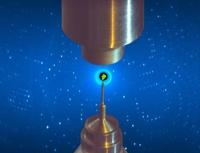Speaker
Description
Structural changes at the intra- and interchain level induced by the phase transition of poly(N-isopropylacryl amide) (PNIPAM) can be tracked in real-time by time-resolved small-angle neutron scattering (tr-SANS). PNIPAM is one of the most commonly and extensively studied thermoresponsive polymer due to lower critical solution temperature (LCST) in water that occurs at the physiologically relevant temperature. Block copolymer micelles and polymer microgels have been used as drug carriers and as microreactors for enzymatic reactions. For drug release and enzyme reactions, the kinetics of the transport across the micellar core and shell region depends on the local mobility of the core-shell region. The control of time-response is of critical importance for applications of responsive polymers. A general and fundamental understanding of the volume phase transition kinetics is still lacking. The aim of the present study is investigation of the collapse kinetics of PS-PNIPAM micelles by temperature jump above LCST using TR-SANS, light scattering and cryo-electron microscopy. The thermal responsiveness was followed over a broad timescale from the early-stage collapse of polymer in milliseconds to slow growth of aggregates in minutes. Using different experimental methods for homopolymers or micellar block copolymers we got comparable results indicating a common multistep scheme. Thus we concluded a general mechanism for PNIPAM polymers behavior depending on the temperature.

